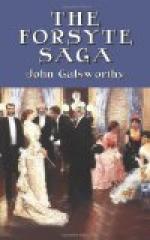“Death was instantaneous. He lay all day yesterday at the hospital. There was nothing to tell them who he was. I am going there now; you and your son had better come too.”
No one opposing this command he led the way from the room.
The day was still and clear and bright, and driving over to Park Lane from Stanhope Gate, old Jolyon had had the carriage open. Sitting back on the padded cushions, finishing his cigar, he had noticed with pleasure the keen crispness of the air, the bustle of the cabs and people; the strange, almost Parisian, alacrity that the first fine day will bring into London streets after a spell of fog or rain. And he had felt so happy; he had not felt like it for months. His confession to June was off his mind; he had the prospect of his son’s, above all, of his grandchildren’s company in the future—(he had appointed to meet young Jolyon at the Hotch Potch that very manning to—discuss it again); and there was the pleasurable excitement of a coming encounter, a coming victory, over James and the ‘man of property’ in the matter of the house.
He had the carriage closed now; he had no heart to look on gaiety; nor was it right that Forsytes should be seen driving with an Inspector of Police.
In that carriage the Inspector spoke again of the death:
“It was not so very thick—Just there. The driver says the gentleman must have had time to see what he was about, he seemed to walk right into it. It appears that he was very hard up, we found several pawn tickets at his rooms, his account at the bank is overdrawn, and there’s this case in to-day’s papers;” his cold blue eyes travelled from one to another of the three Forsytes in the carriage.
Old Jolyon watching from his corner saw his brother’s face change, and the brooding, worried, look deepen on it. At the Inspector’s words, indeed, all James’ doubts and fears revived. Hard-up—pawn-tickets—an overdrawn account! These words that had all his life been a far-off nightmare to him, seemed to make uncannily real that suspicion of suicide which must on no account be entertained. He sought his son’s eye; but lynx-eyed, taciturn, immovable, Soames gave no answering look. And to old Jolyon watching, divining the league of mutual defence between them, there came an overmastering desire to have his own son at his side, as though this visit to the dead man’s body was a battle in which otherwise he must single-handed meet those two. And the thought of how to keep June’s name out of the business kept whirring in his brain. James had his son to support him! Why should he not send for Jo?
Taking out his card-case, he pencilled the following message:
‘Come round at once. I’ve sent the carriage for you.’
On getting out he gave this card to his coachman, telling him to drive—as fast as possible to the Hotch Potch Club, and if Mr. Jolyon Forsyte were there to give him the card and bring him at once. If not there yet, he was to wait till he came.




